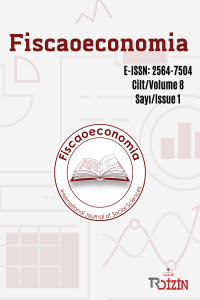Sürdürülebilir Kalkınma Bağlamında Teknolojik İlerlemenin Değerlendirilmesi: Toplum 5.0
Assessment of Technological Progress in the Context of Sustainable Development: Society 5.0
Author(s): İpek KURT, Tansu Özbaysal, Nihal AltunSubject(s): Supranational / Global Economy, Energy and Environmental Studies, Socio-Economic Research
Published by: Ahmet Arif Eren
Keywords: Society 5.0; Industry 4.0; Sustainable Development; Technological Advancements;
Summary/Abstract: Innovative approaches brought by the information and communication age are becoming more common day by day. The fact that countries continue their industrial processes with a sustainable technological infrastructure contributes to both sectors and social welfare. Benefiting from the outputs of Industry 4.0 realized in production technologies, and Society 5.0 focuses on social welfare, social responsibility, and sustainable improvements in all areas. The transformation processes and technological advances, which started with the Industrial Revolution and continued with Society 5.0, are important for sustainable economic conditions, social lives, and welfare of societies, governments, and policymakers. Technological advances, carried out by the United Nations Development Program and considered within the scope of sustainable development goals, are seen as an important way to find permanent solutions to economic and environmental problems, such as new employment areas and increasing energy efficiency on a global scale. In this context, the study aims to determine the level of countries' achievement of Society 5.0 in the context of technological progress, which is one of the UN sustainable development goals. For this purpose, which countries have similar characteristics and are investigated and grouped with them in the context of Society 5.0. In the study, hierarchical and non-hierarchical clustering analysis was performed using 2021 data for 19 countries and the results of the two methods were compared. As a result of hierarchical clustering analysis, 19 countries are classified into four clusters, while due to non-hierarchical clustering analysis, countries are classified into two clusters. Hierarchical cluster analysis is thought to provide more consistent results. According to the results, Russia and Turkey are grouped in one cluster, while China is grouped in a single cluster and India in a single cluster. The other 15 countries included in the analysis are grouped in a cluster.
Journal: Fiscaoeconomia
- Issue Year: 8/2024
- Issue No: 1
- Page Range: 256-276
- Page Count: 21
- Language: Turkish

